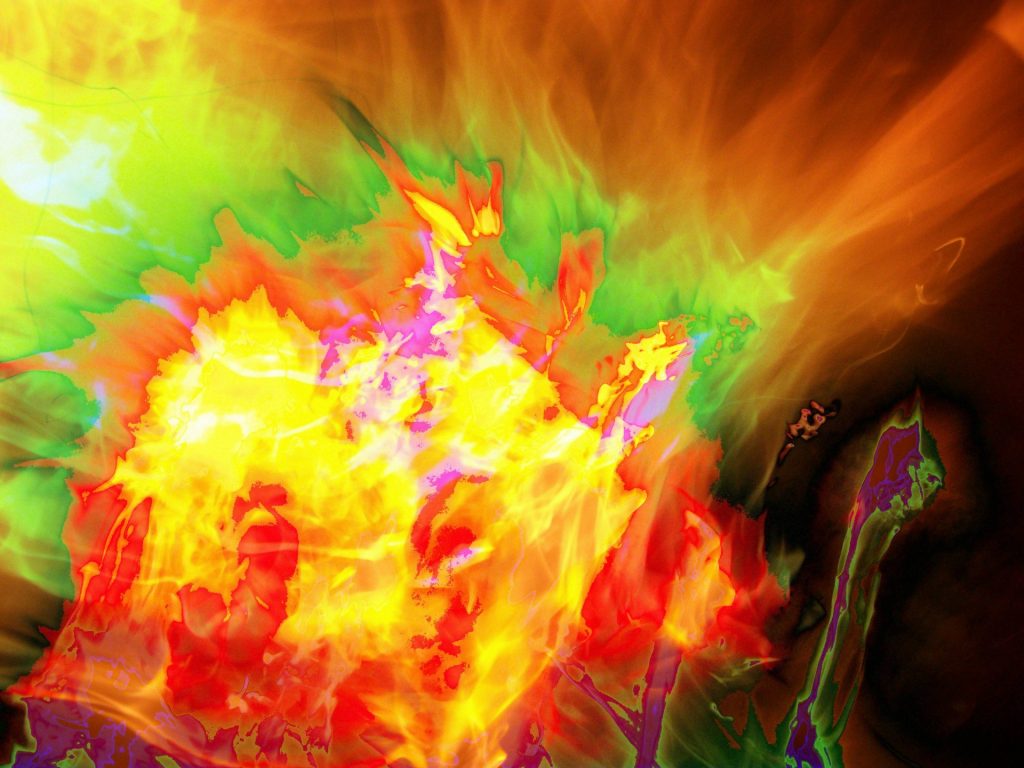Welcome, readers, to mid-January’s issue of Synchronized Chaos Magazine!
We recognize various observances this month: American civil rights leader Martin Luther King’s birthday, Holocaust Memorial Day, Clean Energy Month and World Braille Day and strive to make our publication as inclusive and welcoming as possible.
We are also hosting a free public literary reading in conjunction with the Association of Writing Programs conference next month in Kansas City, MO. This will be at 6pm on the evening of February 7th at Prospero’s Books. All are welcome to come and hear the readers!
Now for this month’s issue: Holding Up Our Corners of the Sky.

Don Bormon and Mahbub both encourage us to move forward into the New Year with optimism.
Sayani Mukherjee describes cultivating herself as if she were a garden. Chimezie Ihekuna urges young Nigerian students to apply the lessons of their education to their lives, values, careers, and future leadership.
Makhfiratkhon Abduratkhmonova illustrates one young Uzbek woman’s pathway to success and recognition as a writer and intellectual. Davronova Lobar advises parents on how to raise confident children, while Saida Ismoilova speaks to having the courage to pursue our dreams.
Farkhodova Nodira extols the good exercise, glory, and discipline involved in playing sports. Dildora Toshtemirova reminds her fellow Uzbek nationals of the many vocational training opportunities in the country while Shabnam Shukhratova outlines the advantages of study-abroad programs for enriching students’ lives.
Taylor Dibbert also reflects on travel, in his piece where the speaker’s life begins to make more sense when he has a change of scene and visits Sri Lanka. Meanwhile, Daniel De Culla provides an earthier travelogue, about local customs on a trip to Morocco.

Maja Milojkovic’s poem compares working artists to fish in an aquarium, constantly observed while trying to accomplish something meaningful. Graciela Noemi Villaverde touches on the more personal side of her poetic practice in a piece where she “meets” with her poetry.
Sitorakhon Buriyeva reminds us that life is short so we should make moral choices and make the most of our time.
J.K. Durick’s poetry explores our human limitations, what we can and cannot accomplish or change in life. J.J. Campbell dredges up the frailty of midlife: loneliness, physical weakness, awareness of one’s mortality. Niginabonu Amirova ponders human destiny and how we must all die, while Maftuna Sulaymonova highlights the cycle of life with a poem where a daughter cares for her aging mother.
Priscilla Bettis also looks at mortality, with gentle haikus about grief and the burial of a loved one. Mesfakus Salahin reminds us that we are all mortal and will all arrive equally empty-handed in the grave. Sabina Abdulazizova’s poetic speaker speculates on how she’d like to be remembered.
A.G. Davis’ poetry evokes death imagery alongside that of outer space and the mythical underworld. Christina Chin and Uchechukwu Onyedikam’s collaborative haikus also reference death and the underworld, alongside space aliens.

Faleeha Hassan’s lush, imaginative poem illuminates the death of creative imagination that is writers’ block. Noah Berlatsky evokes the impermanence of memory and how past relationships fade into the background.
Jerry Langdon illustrates the storm of heartbreak, when his speaker is no longer able to pull into the safe harbor of his past partner. Mavluda Rusiyeva also describes the intense pain of a broken romantic relationship. Gulsanam Abdullayeva speaks to lost love and heartbreak, while Mohichehra Rustamova quests for interpersonal and emotional peace while grieving having caused someone pain.
Maid Corbic’s poetry extols giving love, but recognizes that his love has limits because of his humanness. Cheryl Snell’s work also probes the limits of love, as she relates coldness and neglect within family relationships.
In contrast, John Culp talks of persevering in love, not shutting the door on each other, even in intense moments. Shukratova Shabnam offers a lament and a tribute to a mother’s hard work and sacrifice while Dildora Toshtemirova probes the complexities of a mother and daughter’s relationship.
Kristy Raines writes of a gentle companionship while Sayani Mukherjee evokes a moment where she meets with God, envisioning perfect communion and realization of her best self. In Charos Makhamova’s piece, spiritual and human love commingle, while Elmaya Jabbarova narrates a vivid dream of a spiritual union with a loved one from whom she draws inspiration. Abdusodiqova Fotima urges people to come to God with their pain, as He is a perfect listener.

David A. Douglas’ formal poem shows a bystander, powerless to prevent the train wreck he’s watching, but infused with courage from his faith to endure being a bystander and bear witness to the scene.
Favour Raymond also bears witness, to domestic violence and its impact on children. Daniel De Culla critiques and diminishes the power of today’s warmaking leaders by locating them within the historical context of other warlords whose empires have come and gone. Mykyta Ryzhykh describes the violence of modern warfare, yet illustrates how life as a whole perseveres and outlasts the individuals who are killed. Evie Petropoulou urges world leaders to pursue peace and justice and for all people to remember our interdependence.
Bahora Boboyeva conveys the terror of a family facing political or ethnic persecution. Jeff Rasley describes a riot where activists leave ordinary passersby to bear the brunt of repercussions for their actions.
Brian Barbeito witnesses and laments people’s increasing post-pandemic harshness and pettiness. Arthur Chertowsky describes slowly losing his ability to read or listen to books as he ages, wondering if he is slowly dying away as he ages.
Fayzullo Usmonov narrates the struggles he faced while growing up in poverty and earning a hard-won university admission. Many other contributors discuss education, including Rejabova Dildora, who outlines modern teaching methods for primary education, Mashxura Maxammatova, who suggests innovative methods for teaching English to youngsters, Fatillaeva Nehrinoz, who discusses language instruction in higher education, Shamuratova Shoira, who highlights podcasts as a tool for language learning, Malika Isomiddinova, who covers new methods for teaching vocabulary, and Alisher Ergashev, who goes into information technology tools for teaching foreign languages.

Farrukh Amirov’s poetic speaker escapes real-world injustice through retreating into the historic poetry of his nation.
Dilnoza Xusanova remembers Erkin Vakhidov, a versatile legend of Uzbekistan’s literary heritage. Bahora Boboyeva discusses Bernard Shaw’s sophisticated analysis of social class, education, and personality formation in Pygmalion. Diyora Bakhodirovna outlines psychological theories of the concept and development of personality.
In his latest set of postwoman poems, Mark Young receives deliveries of various icons of history and culture. Lorette C. Lukajic offers up 13 different ways of looking at Edward Hopper’s painting Nighthawks, about the loneliness, or peaceful solitude, of being in a quiet cafe in the evening.
Duane Vorhees writes of history, the passage of personal and mythic time. Z.I. Mahmud’s essay analyzes how T.S. Eliot and Samuel Taylor Coleridge viewed the purposes of art and literature.
Mirzaliyeva Zarinakhan outlines the history of church reformer Jan Hus, while Daniel De Culla evokes the character of an old fashioned road cleaner. Rbs Nsj gives the background of the Village of the Saint shrine which faithful Uzbeks visit on pilgrimage. Farangiz Safarova discusses Korean greetings and social etiquette.

Arts video journalist and filmmaker Federico Wardal announces his upcoming interview with Italian journalist and music promoter Adriano Aragozzini.
Some more modernist writers play with language. Jim Meirose’s onomatopoetic tale appears to concern a spear-throwing game while Daniel Y. Harris encodes Proxy Godbot the Black Hat Hacker into verse that resembles software. J.D. Nelson contributes his signature word fragments for a piecemeal glimpse of the world.
Sitora Mamatqusimova contributes a paean to the glorious history of her native Uzbekistan. Boronova Sevinch and Nigora Togayeva take pride and find happiness and reasons for optimism in their country and family, while Mohinur Sotvoldiyeva outlines some historical Uzbek wedding customs.
Laylo Mamatova shares the history of the Central Asian spring holiday of Navruz, while Zuhra Ruzmetova waxes effusive about the beauty of Uzbekistan in the spring. Wazed Abdullah writes of the history embedded within a long-flowing river while Muntasir Mamun Kiron rejoices in the beauty of the land and culture of his native Bangladesh, Lilian Dipasupil Kunimasa anticipates the fun of summer in an upbeat piece and takes comfort in gentle winds, and Mahbub Alam reflects on a foggy, quiet morning.
Isabel Gomez de Diego’s photography explores how people experience built environments, on small and larger scales.

Safarova Ozoda speaks to the impact of humans on the earth and the importance of preserving and caring for the environment.
Laura Stamps interacts with nature in a more personal way, through adopting a playful puppy!
We hope this issue will have moments of fun alongside those of beauty and tenderness and intellectual stimulation.

Excellent site👍